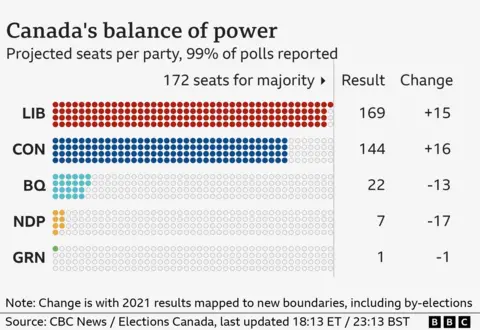Physical Address
304 North Cardinal St.
Dorchester Center, MA 02124
Physical Address
304 North Cardinal St.
Dorchester Center, MA 02124

The president of the United States, Donald Trump, called the Canadian Prime Minister Mark Carney to congratulate him for his victory in the country’s general elections and the two agreed to meet in the near future.
The two countries were expected to enter conversations about a new economic and security relationship after Monday’s vote.
Trump’s commercial tariffs and the repeated comments that undermined the sovereignty of Canada eclipsed the race, which ended with the liberals of Carney projected to win a minority government, according to the CBC public broadcaster.
That result will make Carney’s pressing tasks to negotiate with his American counterpart and address a variety of domestic problems are a challenge, since he will need to dispute the support of other political parties.
In his first call from the elections, Trump congratulated Carney for his victory, according to Prime Minister’s office on Tuesday.
The office also said that the two leaders had “agreed to the importance of Canada and the United States working together, as independent and sovereign nations, for their mutual improvement.”
Liberals must trust their support to approve legislation through the House of Commons.
They also face a possible defeat in any vote of confidence in the camera.

It is more likely that liberals find partners willing with the new decreased left -wing democrats, who in the past have supported the liberals and the Quebécois block.
It is projected that the liberals have won 169 seats, three less than the 172 necessary for a majority in the Chamber of the Commons in Canada.
It still marks a historical change for a party that had seemed in progress for collapse only months ago.
Carney, a former central banker from Canada and the United Kingdom, will continue as prime minister, after having participated in the role last month after the unpopular predecessor of Justin Trudeau.
A problem in which it can be easy for liberals to find support in the Chamber is to approve legislation to help workers and industries affected by US tariffs, something that all parties realized in the campaign.
On Tuesday morning, Bloc Québécois leader, Yves-Francois Blanchet, suggested that Carney could benefit from at least a period of stability in the house.
Blanchet urged a “truce” between the parties, while Canada negotiated trade with the United States, saying that it was clear that the Canadians wanted political stability in unstable times.
He said it was not time for other parts to “threaten to overthrow the government in the short term” and not see any scenario “that is not collaboration for a period of just over a year.”
The leader of the Sovereign Party, who only directs candidates in Quebec, urged Carney to avoid pressing the province on certain issues, pointing out that collaboration goes both ways.
On Tuesday, the White House commented on the victory of Carney, with the deputy press secretary Anna Kelly saying: “The election does not affect the plan of President Trump to make the precious state 51 of Canada of the United States.”
In An interview with the BBCCarney said that Canada deserves “respect” from the United States and that it will only allow a United Canadian trade association and security association “in our terms.”
Carney has told the BBC that a 51st state scenario “never, will never happen.”
Meanwhile, the new United States ambassador to Canada, Pete Hoekstra, said in a video statement that he is “committed to progress in this great relationship.”
Carney has also promised actions in a variety of national issues, including approaching the country’s housing crisis and tax cuts for low and medium -sized income Canadians.
The prime minister also needs to prepare for the G7 summit in June, which Canada is organizing in the province of Alberta.
In Monday’s elections, both liberals and conservatives saw a significant increase in their part of the national vote compared to four years ago.
The Conservative Party arrived in second place, on the way to winning 144 seats and will form an official opposition.
The greatest support for the two largest games in Canada has reached the expense of the smallest matches, particularly the NDP, whose part of the popular vote has decreased by around 12 percentage points.
The electoral participation for the elections was 67%.
Both conservative leader Pierre Poilievre and the leader of the NDP Jagmeet Singh lost their seats, and Singh announced that he will resign as leader of the Left Party.